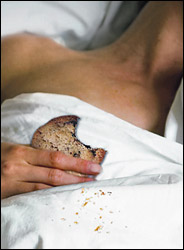Headache medications that are available over the counter in the local drugstore are ineffective when it comes to a migraine headache, and migraine sufferers have received great help from medications that are targeting a migraine attack. They are non-narcotic prescription drugs, some of which have to be injected. They are available under names like Amerge, Axert, Frova, Imitrex, Maxalt, Relpax or Zomic, and the medication group is known in pharmacists’ language as “triptans”.
The medications are generally well tolerated, but the FDA has issued a warning.
In combination with another medication group, life threatening side effects can occur.
Any patient who is receiving medication for the treatment of depression in the form of a Selective Serotonin Reuptake Inhibitor (SSRI’s) is strongly warned, not to take any of those listed triptans for migraine. The anti depressive drugs are Celexa, Fluvoxamin, Paxil, Prozac and Zoloft. Two other medications, namely Effexor and Cymbalta are Selective Serotonin/Norepinephrin Reuptake Inhibitors (SSNRI’s), and they carry the same risk when taken in combination with the triptans.
The combination of the two medications can lead to a dangerous condition known as Serotonin syndrome. It occurs when the body has too much serotonin, a chemical found in the nervous system. Serotonin syndrome symptoms may include restlessness, hallucinations, loss of coordination, fast heartbeat, and rapid changes in blood pressure, increased body temperature, overactive reflexes, nausea, vomiting, and diarrhea. Serotonin syndrome may be more likely to occur when starting or increasing the dose of a triptan, SSRI or SNRI.
It is up to the prescribing physician to carefully weigh the advantages against the serious side effects, and it can be a difficult choice, as both conditions, migraine as well as depression, need to be treated effectively. Any patient who has to take both medications has to be closely watched. The patient also has to be alert to any side effect.
Reference: FDA/Center for Drug Evaluation and Research, July 19, 2006
Link to chapter on migraines in Net Health Book: http://nethealthbook.com/neurology-neurological-disease/common-causes-headaches/migraine-headache/
Last edited Nov. 1, 2014







